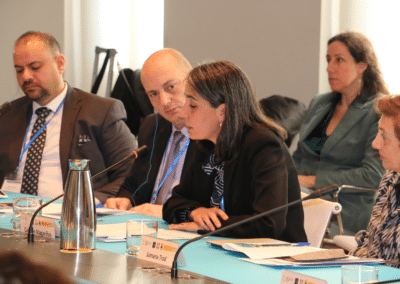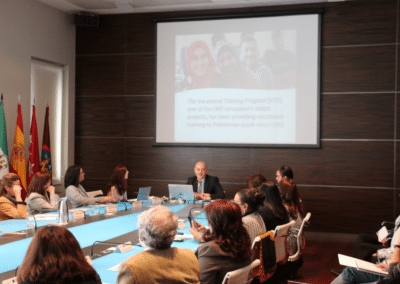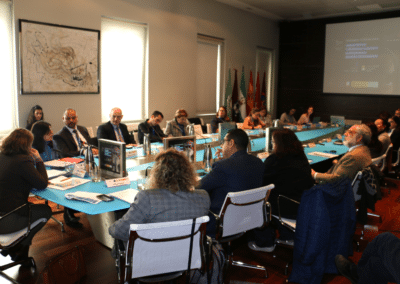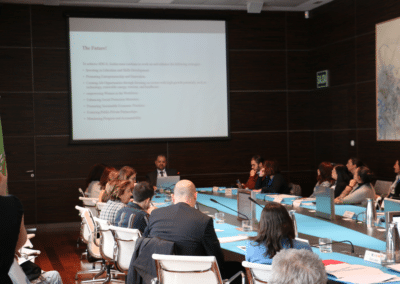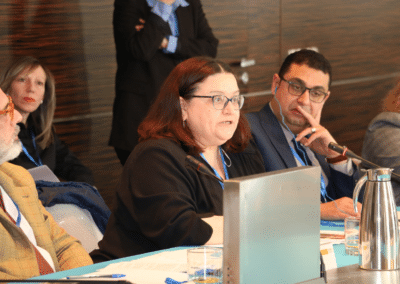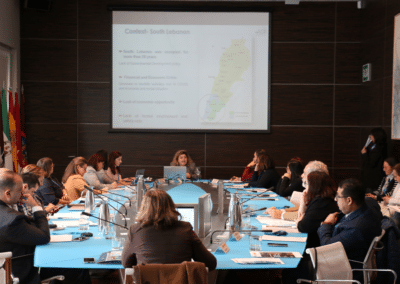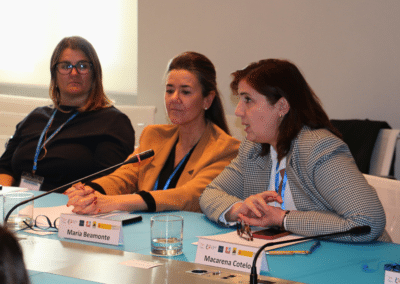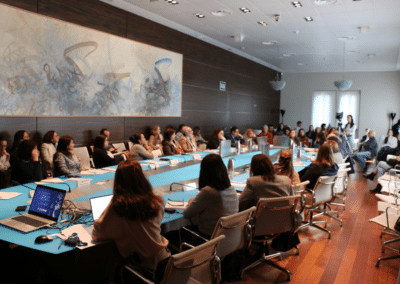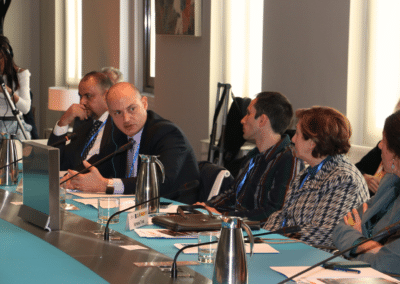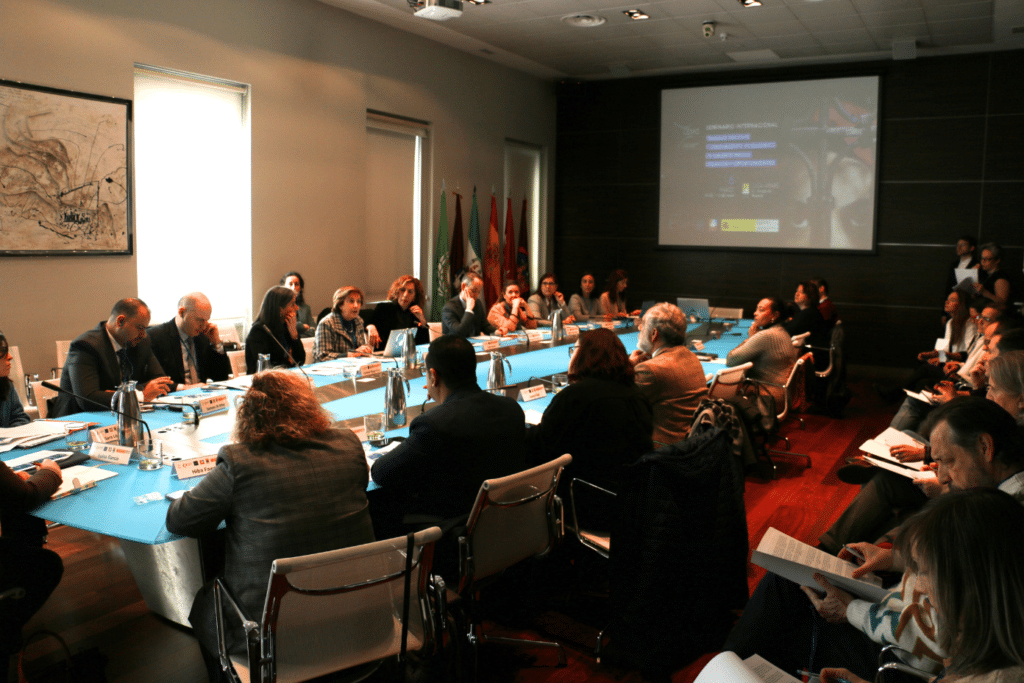
Representatives of the Ministry of Foreign Affairs, European Union and Cooperation, the Spanish Agency for International Development Cooperation (AECID), the International Labor Organization (ILO), Workers’ Commissions (CCOO) and AIDA (Aid, Exchange and Development), as well as several experts from various organizations in Middle Eastern countries, have gathered at the International Seminar ‘Decent work and economic growth in the Middle East: challenges and opportunities’. This meeting, organized by the Social Promotion Foundation, through its Middle East Studies Center (CEMO) and its Women and Equality Observatory (OMEI), was held at Casa Arabe.
The director of the Human Rights Office of the Ministry of Foreign Affairs, European Union and Cooperation, Fernando Fernández-Aguayo, together with the general director of Casa Arabe, Irene Lozano, and the president of the Social Promotion Foundation, Jumana Trad, have given Welcome to all participants and attendees. Trad has valued the presence of the speakers from the Middle East in this seminar, since “Despite the tragic and very difficult situation that their countries are going through, they wanted to come to Spain and share with us their experiences and knowledge in the area of access to decent and sustainable work”. Likewise, she has expressed his confidence that this meeting “not only represents a space for the exchange of knowledge and experiences, but also and, above all, is a great opportunity to create a space where we can draw up concrete strategies and positive actions to address the challenges we face in this area.”
Next, Carmen Magariños, director of Cooperation with Africa and Asia at the AECID, highlighted that the Middle East is a priority for Spanish cooperation, as well as that decent work and economic development are the basis of all the Agency’s actions in the region. In addition, she has announced that the AECID is working on a new Regional Program for the Arab World that will consider the creation of employment and opportunities as one of its three basic areas of intervention, along with ecological transition, environment and water, and gender equality. gender. Likewise, Magariños has insisted on the importance of addressing inclusive growth and decent work from a comprehensive perspective, not just an economic one, since they are key and transversal vectors for the fight against existing inequalities in the region.
The case of Palestine and Jordan
In the first session of the Seminar, the cases of Palestine and Jordan were addressed in relation to SDG 8. In this part, moderated by the head of the Department of Cooperation with the Arab World and Asia of the AECID, Luisa María García, they intervened Yousef Shalian, director of the Vocational Training Center in Beit Hanina The Lutheran World Federation (LWF) in Jerusalem, Sameer Al Attar, director of Learning and Opportunities of the Jordan Hashemite Fund for Human Development (JOHUD) in Jordan, and Sara López, counselor technical assistance of the ILO in Spain.
First of all, Shalian has presented the Vocational Training Program (VTP), one of the oldest projects developed by the Jerusalem LWF since 1949 “to offer vocational training opportunities and access to paid employment to young Palestinians and, thus, also contribute to the economic, social and human development of Palestine”. Regarding the current critical situation, conditioned by the conflict in the West Bank, Shalian explained that the LWF of Jerusalem is providing psychosocial support to students, their families and trainers who are being affected.
Regarding the case of Jordan, Al Attar has introduced the work of JOHUD by underlining its commitment to human development and sustainable livelihoods. Likewise, he explained some of the main challenges facing his country, such as the pressure of migratory flows of refugees from countries in the conflict zone, the increase in unemployment (especially among women and young people), the gender in terms of economic independence, the tightening of monetary policy or the fall in raw material prices.
In this sense, Al Attar has also indicated the path that Jordan must follow to advance in meeting SDG 8, paying special attention to investment in education and training, promoting entrepreneurship and innovation, and empowering women. as an essential part of the workforce, to the improvement of social protection measures, to the promotion of sustainable economic practices and public-private alliances, and to the creation of job opportunities in sectors with high growth potential (technology, renewable energies , tourism, medicine…).
For his part, López has defined the vision and work of the ILO in relation to the development of SDG 8 in the Arab States, in which women constitute one of the most disadvantaged population groups in terms of decent employment and economic development, presenting a significant income gap since, according to the ILO, they represent only 12.5% of total income.
Specifically, López has also analyzed the specific cases of Jordan and Palestine. In this way, he has referred to the former as a “Beacon of stability in a volatile region”, highlighting its capacity for creating decent employment and business development, its social protection system, its work in favor of gender equality and non-discrimination, existing social dialogue, or the application of international labor standards in the country.
With respect to Palestine, López has mentioned a recent report on “the work of the ILO in relation to the crisis in the occupied Palestinian territory”, which, among other issues, includes an emergency response program, analyzes the measures adopted by the ILO responds to the situation and includes a call for funding critical needs of Palestinian workers and employers.
The case of Lebanon and Egypt
In the second session, moderated by Javier Gila, director of AIDA (Aid Exchange and Development), Hiba Fawaz, director of the Agriculture Program of the Association for the Development of Rural Capacities (ADR) of Lebanon, Emad Gerges, coordinator of the AECID Agreement at the Association of Upper Egypt for Education and Development (AUEED) in Egypt, and Alejandra Ortega, responsible for Arab Countries, Africa, Asia and ILO at the International Secretariat, Cooperation and Migration of the Trade Union Confederation of Workers’ Commissions of Spain.
Fawaz intervened first to present the case of Lebanon, a country marked by a deep social and economic crisis since 2019, with the situation in the south of the country being especially aggravated by the conflict in the West Bank. Currently in Lebanon, 75% of the population is below the poverty line, a situation that hits young people and rural areas hardest, which suffers the consequences of the lack of structural and public development policies.
In this context, Fawaz has detailed the work of ADR to empower the most vulnerable communities in Lebanon (women, youth, farmers, fishermen and refugees) and help them achieve their own livelihoods through the implementation of projects of economic and social development.
Next, Gerges recalled that working towards SDG 8 involves supporting the dignity of human beings, maintaining the stability of societies, preserving the survival of people in their communities and countries of origin, guaranteeing access to equitable education and good health care, and help spread peace.
Therefore, it has highlighted the transversality and importance of this SDG as a “cornerstone” to achieve social change that allows maintaining economic growth and a higher standard of living for individuals and society as a whole. Within the framework of this objective, Gerges has referred to the ‘Egypt Vision 2023’ strategy and the work of AUEED itself, with which, fundamentally, an attempt is being made to reduce the impact of poverty on the vulnerable population (especially in women and youth) providing them with job opportunities and training.
Lastly, Ortega has analyzed the goals of SDG 8 in the Middle East in relation to other economic, social and cultural rights, paying special attention to the state of labor and union rights in this region. Among them, he has highlighted the right to a fair and equitable salary, to safe and healthy working conditions, to equal opportunities and non-discrimination at work, the right to social protection, the effective application of international labor standards. work, freedom of association and union.
Thus, Ortega has declared that “we cannot talk about decent work without talking about fundamental freedoms. This applies and affects, logically, all regions of the world without exception and is not an exclusive issue of the Middle East.”
The seminar ended with a final debate, moderated by María Beamonte and Macarena Cotelo, general director and project director of the Social Promotion Foundation, respectively. In this space, attendees have been able to direct their questions to the various speakers and share all the main ideas and conclusions that have emerged throughout the meeting.





